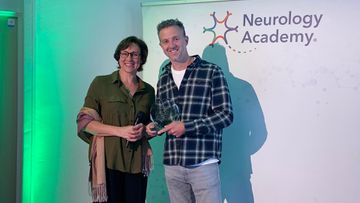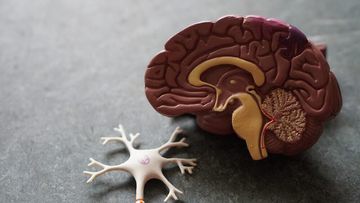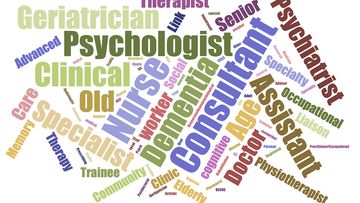Dementia MasterClass Feedback
NewsWith our next Dementia MasterClass set to run in November of this year we wanted to share previous delegate’s experiences of the course.
The overall course was awarded the highest level, a ‘5’ by 97% of attendees for both its quality and relevance, with over 80% assigning a level ‘5’ to the extent to which they will modify their practice following the course and the remaining majority putting this at a ‘4’.
‘The course was extremely well organised, excellent timekeeping, logical format, fantastic speakers, top class organisers’
Delegates said that the ‘excellent, comprehensive course’ had a strong slant towards the practical as all our courses do, and a number of delegates noted this, with one delegate succinctly saying
‘I feel I have learnt new tools for management of patients and good practice ideas.’
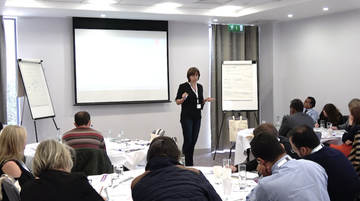
Prof Iracema Leroi at our MasterClass 2017 in Manchester
‘Fantastic faculty’
Our faculty for the Dementia MasterClass are immensely passionate about their topics and this shines through in their teaching. With delegates describing them as
‘very knowledgeable and enthusiastic lectures and teachers’.
Key faculty members and co-creator of the MasterClass Dr Ross Dunne was described in evaluation as an ‘excellent presenter’ and a ‘passionate speaker with a clear understanding of dementia and cognition.’ Having co-founded the Dementia MasterClass with the Neurology Academy. Professor Iracema Leroi was said to have ‘a natural talent for exploring her topic’ with ‘a very engaging presentation style’.
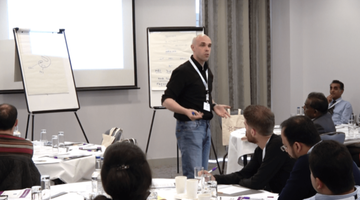
Dr Ross Dunne, MasterClass 2017 in Manchester
New learning
When we create a MasterClass we are always aware of the mix of attendees we are likely to have in the room, which can make gauging content level challenging. It is, however a challenge we enjoy meeting. From the introduction to dementia with its ‘good mix of evidence-based topics and theories for more targeted dementia treatment’ providing an ‘interesting overview of dementia in a societal context’ onwards, even where topics felt well-known there was still something new to take, with one delegate saying of the acute management workshop that
‘as a geriatrician I knew a lot of it know a lot of it but the speaker gave an interesting new perspective.’
Much of the content felt new – or to be covering known topics at a far deeper level – for the majority of our delegates. On the session looking at medication management for cognition an attendee said, ‘I now have a much better understanding of rationale for treatment options especially regarding enhanced discussions with mental health colleagues and patients and their relatives.’ When looking at recognition of behavioural disturbances in dementia, one delegate shared ‘I learned a lot from this which I was not aware of with regards to pharmacological relevance in BPSD’ (BPSD referring to the behavioural and psychological symptoms in dementia).
The majority of delegates noted their expectation to modify their practice, with a delegate saying of that the review of patient assessment tools
‘Made me think about several patients whom I will be going back to review.’
Some of the workshops confronted a new way of looking at the clinical processes, such as the mini-workshop Dr Ross Dunne lead on cognitive assessments. Some delegates found that it was ‘very interesting to explore less well known cognitive tests’ whilst others inadvertently discovered a level of empathy for their patients; one delegate noting ‘excellent session highlighted the intensity of cognitive tests for our patients.’
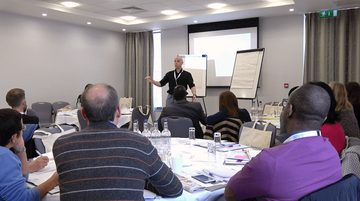
Dr Ross Dunne, MasterClass 2017 in Manchester
Topic by topic
The session for managing dementia in an acute setting was described as being ‘Inspiring, logical, with clear management of clinical symptoms.’ whilst another delegate noted the practical applications of the teaching, helping them to ‘formulate a management plan and give considerations for making the environment dementia-friendly.’
The case management format of discussing aspects of management on a case by case basis with a different presentation of dementia for each case was very well received. There was ‘excellent discussion and interaction’ in the sessions and one delegate noted that it was ‘really useful to talk through completely different cases to illustrate the points’. The overview of the ‘severe’ case was described as ‘excellent and inspiring’ whilst another delegate noted the
‘clear talk covering multiple medical, psychiatric and legal and ethical issues. Interesting to hear about sleep hygiene to help manage dementia patients.’
Some topics covered by the MasterClass could be in danger of being a little dry, such as neuroimaging or legislation. However the ‘Practical neuroimaging’ presentation by Dr Tobias Langheinrich was ‘the best presentation I have heard on imaging. Very logical approach and how to order and read scans’. Meanwhile, the mini-workshop on legal aspects by Dr Mahesh Gopakumar covers a great deal and whilst ‘typically a very dry topic but was brilliant and very interactive, which held everyone’s attention.’
Related articles
Promoting prevention, supporting management
Led by proactive clinicians determined to see improvement in the way we prevent, diagnose and manage dementias, Dementia Academy supports healthcare professionals with the latest tools, resources and courses to do just that.
